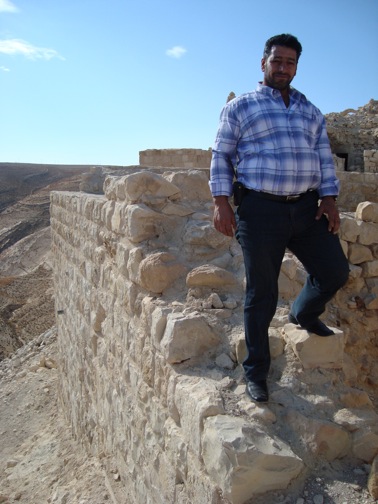Parshas Beshalach: Never Judge a Book by its Cover
It was a warm and rainy afternoon in Aqaba, Jordan. We had crossed the border from Eilat the day before, only to discover that the Muslim festival of Eid was about to start. This meant that there were no hotel rooms available the next night for any sort of reasonable price, so after spending the day exploring Aqaba, we figured we’d better leave.
We figured we’d take a bus to Wadi Musa, the village right outside the world-famous site of Petra, and try to find something there. Of course, it would be expensive, but it would be expensive anytime, not just when vacationing hordes descend for Eid, like they do in the beach town to the south. (Isn’t it funny how some things are the same in every culture?) We tried in vain to find a bus, but everyone kept telling us they weren’t running because of the Eid festival.
While we were standing around, several taxi drivers approached us. We knew the bus cost about $3 Jordanian per person and we were determined not to pay more. Of course, the taxis wanted to charge us ridiculous amounts, but we turned away their $50 offers immediately. One man kept persisting, insisting that he was a taxi driver from Wadi Mussa who had to return there anyway. We eventually convinced him to take us for only $10, just slightly more than the $6 we would have spent to take a bus (had there been one).
We fully expected to be ripped off. We were certain our cab driver would try to charge us $10 each instead of the $10 total that we’d agreed on – a common scam tactic used in third world countries. To our surprise, as we drove the long way up to Wadi Mussa, we struck up a wonderful conversation with our cabbie. We chatted about our families and the kind of foods the Jordanian people eat, which led him even to invite us over to his house. Not only did he invite us for a meal, but he invited us to stay!
We ended up staying 4 days with the Jordanian family and the whole time they were incredibly welcoming and hospitable, even understanding that we couldn’t eat most of the food they offered us. It didn’t even matter to them when they found out we were Jewish! And of course, our cabbie didn’t overcharge us at all. We had a great time.

Crossing the Red Sea (or the Sea of Reeds) would have been much harder for the Jews in a time where there were no giant ships to ferry them across.
At the beginning of time, when G-d created the earth, He knew that certain events would happen and designed the world accordingly. The Torah was the blueprint for the world, after all. One of the things that He did in preparation was to command the Sea of Reeds to split for the Jews. Yet, we see in this week’s parsha that the Sea did not split immediately for the Jews, in spite of being told to directly by G-d. Why?
When the Jews approached the Sea, they were spiritually filthy. They looked and acted like Egyptians. The Sea took one look at them and decided they did not meet the description it had been given of G-d’s chosen people. It only split when one man, Nachshon ben Aminadav, was confident enough of G-d’s proclamation that He would save them, that he began to walk into the Sea. Only once this happened was Moses able to lift his staff and split the Sea. Only once the Sea recognized the true spiritual nature of the Jewish people through Nachshon’s action could it carry out G-d’s prior command.
Just as we judged our Muslim taxi driver unfavorably, the Sea of Reeds judged the Jewish people wrongly. Yet both our taxi driver friend and the Jews showed their true selves and proved that judgment wrong.
The truth is, we do this every day. We see other people and we judge them – often poorly. We are quick to anger and quick to judge, in spite of the Torah’s teaching to judge everyone favorably. Yet we ourselves are often judged unfavorably and we don’t like it much. We expect the traffic to split for us, we expect lights to turn green and grocery store lines to be short. We expect others to recognize our inner worth and yet we have such a difficult time doing this for others.
There are two morals to this story that we can work on in the coming week. First, when we meet others, we must do our best to judge them favorably. We must see them for who they really are, for the G-dly soul they possess within them. Even if this means we must struggle to see the good in them, even if we can find only a tiny spark, we must seize hold of it and amplify it because this is what the Torah commands us to do and because it is what encourages others to grow.
Second, when we ourselves feel (or are) wrongly judged, not to react with wailing or anger or seek to retreat, as many of the Jewish people did when they were trapped at the shore of the Sea of Reeds. Rather, we must do as Nachshon ben Aminadav did and walk boldly forward into the sea, showing everyone the true strength, beauty, and goodness of our inner selves. Without us needing to argue at all, others will recognize our inner worth simply by our actions. And indeed, we did this when we met our Muslim taxi driver friend: we acted as Jews in his presence, with respect and chessed, without anger or defensiveness… and, whatever his preconceptions may have been, he recognized our kiddush Hashem and reacted to that. Today, I am sure, he sees Jews differently as a result of our friendly interactions. If ever we are judged wrongly we must seek to act as true Jews and do a kiddush Hashem.
Read More





